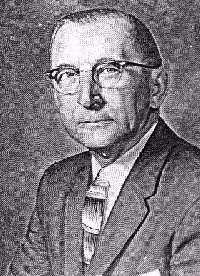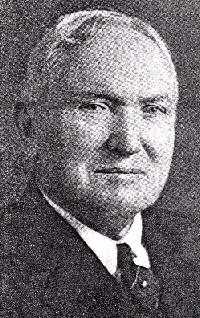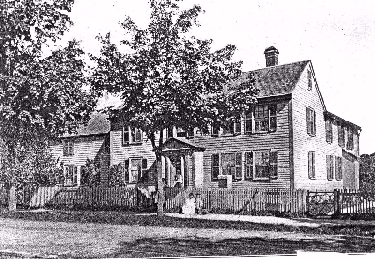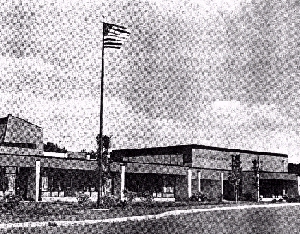
By Tabitha Spinney and Shannon Quirk

The school's namesake, William A. Welch, Sr., was born on June 16, 1895 in Lynn, Massachusetts. His father, Peter Welch, was born in Ireland, and his mother, Katherin Donovan, was born in England.
William attended Lynn Classical High School, Boston College in 1932, Georgetown University and Suffolk University. He was a teacher at Peabody High School from 1924-1933 when he was appointed Superintendent of Schools. Retiring in 1961 after 28 years as Superintendent, he was the longest serving Superintendent in Peabody's history.
He married Margaret M. Giles and they lived as 124 Lynn Street in Peabody with their two children, including William A. Welch, Jr. who went on to serve as an Assistant Superintendent, Principal of Peabody Veterans Memorial High School and a member of the Peabody School Committee.
William A. Welch, Sr. died of pulmonary emphysema at J.B. Thomas Hospital in Peabody on September 8, 1970. He was 75 years old. He is buried in St. Mary's Cemetery in Salem, Massachusetts. (Source: Records of Deaths, Peabody City Hall)
When the school was dedicated on September 15, 1974, biographical information and a photo of Mr. Welch were printed in the program of the event. A copy of this program was made available by the Peabody Historical Society and by Mr. Welch's son, William A. Welch, Jr.
From the program of the Dedication Ceremonies, September 15, 1974
Mr. Welch served the City of Peabody from 1924 to 1961, first as a high school teacher from 1924 to 1933 and then as Superintendent of Schools from 1933 to 1961. His tenure saw new and unique problems for Peabody and he, ever alert to new developments in economics, sociology and education, met these changes.
Rehabilitation projects were begun with addition to the Keefe and Brown Schools. His administration saw the construction of the South Memorial, Center and Kiley Schools and the planning of the West Memorial School.
During the early years of his tenure he was instrumental in establishing the Vocational High School.
In addition to his administrative duties for the City of Peabody, he was a part-time professor of education at the Boston College Graduate School of Education. He was also a former professor at the summer sessions of Boston University and of the Boston College School of Education award as the outstanding school administrator of New England.
He received his Bachelor of Arts and Master of Arts degrees from Boston College and his Juris Doctor degree from Suffolk University Law School;, where he was president of the Senior Class.
During World War I he served as a Lieutenant and Staff Officer.
On his retirement as Superintendent in 1961, Mr. Welch became Executive Secretary of the Massachusetts Association of School Superintendents.
His organizational memberships included the following: New England Association of School Superintendents; President of the Massachusetts Association of School Superintendents; President of the Harvard Round Table; North Shore Superintendent's Association; Superintendents' National Century Club; Massachusetts Bar Association; Superintendents' National Century Association of School Administrators; Honorary Life Member of the Massachusetts Parent-Teachers Association; a member of the North Shore Association for Retarded Children.
Mr. Welch was a past commander of Peabody American Legion Post 153; past president of the Peabody Rotary Club; former director of the Peabody Chapter, American Red Cross; former finance chairman of the North Shore Council, Boy Scouts of America; a former member of the Peabody Library and Lyceum Committee; an honorary member of Leo Council, 508, Knights of Columbus; first president of the Holy Name Society, St. Ann's Church, South Peabody.
Upon hi s retirement, after 37 years in the field of education, former Commissioner of Education, Owen B. Kieman, referred to Mr. Welch as "Mr. Massachusetts Education".
We are proud to dedicate this school to a man whose life was dedicated to education.
The naming of the William A. Welch, Sr. school was not the first time that Welch's name was considered for a school building. At a meeting of the school board in June 1961, shortly after Welch, Sr. announced his retirement as Superintendent, Mayor Philip C. O'Donnell said that "the testimonial dinner being arranged to honor Superintendent Welch was a deserving tribute, but that it is more desirable that a more lasting tribute be paid to Superintendent Welch for his services in the cause of education in Peabody." O'Donnell then moved that the new Bow Street school be named the William A. Welch Elementary School.
Stating that he did not desire this honor and did not know in advance that such a proposal was to be made, Welch expressed his desire to retire from the meeting while this matter was under discussion and withdrew to his office.
The school board eventually named the school the West Memorial School.
Supt. Welch Submits Resignation (Appendix 1)
Tribute to Welch Unanimously Approved (Appendix 2)
rovidas O'Conor,
Who is the namesake of the park adjacent to the school's play area?
By Tabitha Spinney and Shannon Quirk

Patrick Roger O'Conor was born on February 9, 1852 in Ireland. He was the second of twelve children. His parents were Peter O'Conor and Elizabeth Kelly.
He attended the Marist Borthers College in Sligo. He was described as "an apt scholar, a great reader and advanced in mathematics.
O'Conor had some family and friends living in Lawrence, Massachusetts so he went to that city where he got a job in Washington Mills. He opened an evening school to teach the workers who were not educated.
When he was eighteen he got a job at the Danvers Bleachery on Foster Street. The Danvers Bleachery was built in 1847 and twelve years later employed sixty men to bleach goods. It became Pequot Mills in 1909.
When he retired from the position at the Bleachery, he received a loving cup that the following inscription: "Presented by his business associated, A token of friendship and esteem, Developed through fifty-six years at Danvers Bleachery, A Fine Citizen, A Faithful Overseer, A true friend."
In 1919, the school board began to consider a proposal to create schools in factories in the following year a special meeting was held to hear an improvement plan about sugggestions for a new school in the Bleachery district. However, the city decided instead to immediately begin teaching Americanization through evening school classes.
He served on the Peabody Parks Commission for twenty years and helped to open the first public playground in the city.
O'Conor was Vice-President of Warren Five Cents Savings Bank, and President of the Massachusetts Cooperative Bank League in 1915.
On February 9, 1899, Mr. O'Conor married Elizabeth Mullane, a native of Peabody. They had seven children. Three of their children died as infants.
The Welch School is situated where the third-base-side
of O'Conor park was once located. The land right under the school is where
the first lighted softball field in Peabody was located. (Source:
Looking Back by Edward McMahon, Assistant Principal Welch School, 1994.)ation
of the William A. Welch, Sr. school is ke
The city's namesake, George Peabody, lived in the neighborhood of today's Welch School. Describe his early life.
By Tabitha Spinney and Shannon QuirkPeabody. Describe his early life and schooling.
By Tabitha Spinny and Shannon Quirk
George Peabody was the fourth of ten children born to Thomas and Judith Peabody on February 18, 1795. His father served in the Revolutionary War and his mother was a native of Georgetown, Massachusetts.
Judge Alden P. White in an address at the 50th Anniversary of the founding of George Peabody College, stated, "In recalling the youth of George Peabody one has to resist an inclination to inject a not of poverty, the opportunity for rhetorical contrast is so inviting. To make the contrast as effective as possible he should have been a barefoot boy - an probably he was. There should be at least a suggestion of a ragged jacket and a hint of hunger yearning for the bun in the bake shop window.
"The boy, George Peabody, never suffered from abject poverty. He inherited from his parents and their New England stock a sound body, a clean mind, a keen conscience, a reverent acknowledgment of divine and human law. If these things were his only heritage he was no poorer than thousands of other boys who were his contemporaries. And he has some schooling, probably as much as most other boys of his time."
George Peabody had many jobs when he was young. His first job was as an apple picker. When he was old enough, he started worked as a clerk at Sylvester Proctor's drug store. He wasn't very educated because he only went to school until he was twelve, but he was educated enough to work at the drug store. He also worked in a dry goods store with his brother in Newburyport. Later, the store was consumed by fire. Between 1806 and 1811, he spent a year helping his grandfather out in Thetford, Vermont
After his father died, he sailed from Newburyport with his uncle, General John Peabody, of Georgetown, D.C. George Peabody was so good at his job the he became a partner of Elisha Riggs in the dry goods trade. It became Peabody, Riggs & Co. Retiring from the firm, Georg Peabody became known as a merchant and money broker under the firm name of George Peabody.
In 1851, he gave a gift of $15,000 towards the American Exhibit at Crystal Palace, the first World's Fair. He made many other contributions. He gave $10,000 towards the Kane Artic Expedition in search of Sir John Franklin.
That same year, he gave $20,000 for the Foundation Fund for the Peabody Institute, Peabody (for public library and lyceum). He also gave an additional gift of $10,000 for the Peabody Institute. Five years later, he founded the Peabody Institute in Baltimore. It was dedicated in 1866.
He was so caring that he gave a gift of homes for poor people in London. Between 1862 and 1869,his gifts in the United States included the large Southern Education Fund. In 1866, he received a portrait of Queen Victoria and an autographed letter which was sent to the Peabody Institute in peabody. Not too long after that, South Danvers changed its name to Peabody in honor of him. George Peabody's last visit to Peabody before he died was on September 13, 1869 (??).
He was given a lunch at the Peabody Institute on Main Street which was attended by: Hon. Charles Sumner, Hon. Robert C. Winthrop, Ex-Gov. Clifford, Oliver Wendell Holms, James M. beebe and Stephen Salisbury.
Not too long after that, on September 4, he died in London, England. Between November 12 and December 1, he lay in Westminister Abbey, London. In January, his body was put on board the British man-of-war "Monarch". Escorted by the U.S. man-of-war "Plymouth", his body arrived in Portland, Maine.
Delivered by a special train of the Eastern Railroad, his body arrived in his native town on February 1 where it lay in state at the Peabody Institute. Seven days later, the funeral was held. Services were held at the old South Church and burial was in Harmony Grove Cemetery. After his death, no one forgot what great deeds he did. (Sources: "Mr. P - Newspaper Accounts of George Peabody and His Hometown", Manuscript by S.M. Smoller; The Peabody Story by John Wells; "Unusual Picture of Youth of George Peabody", newspaper clipping from the Peabody Historical Society.)
illiam
What are the unique features and programs of the William A. Welch, Sr. School in 1998?
. Welch Sr. School?
About twenty percent of the school's population is Hispanic and between five and ten percent of the students are Portuguese. Principal Helen Apostolides said, "We like to have signs up so that they can read them. We have a lot of immigrants, new people coming into the country, by having those signs up it give a much more welcoming feeling." The School Council also translates notices into Spanish and the school's handbook is printed in both English and Spanish. The school library also stocks a selection of books in Spanish.
In 1996, William Steven Multner, a parent at the school, offered to do a project for the school that involved students in the creation of a mural in the school's foyer. He drew the outline of the mural, which depicts the school in each of the four seasons, and pupils from the fourth grade painted the design.
There is a successful inclusion program at the school which is overseen by teacher Elaine Metropolis. "We take in students with autism or pervasive developmental disorders," she explained. "They're fully included into the classroom. There's a classroom aide with them and we have a consultant who comes in and helps with the inclusion process. It's very labor intensive but we have a lot of compliments.
Metropolis, who recalls the school's early inclusion efforts, said, "I can remember our very first inclusion child was when we were just beginning to learn about what inclusion was and he would just come in fo Metropolis, who recalls the school's early inclusion efforts, said, "I can remember our very first inclusion child was when we were just beginning to learn about what inclusion was and he would just come in for 20 or 30 minutes a day. We thought, well this inclusion, but it's grown by leaps and bounds and now when children are included in this inclusion program, they're included as a regular member of the classroom. They feel a part of our family. We all support each other."
In the school officer, there is a wall adorned with plaques honoring teachers who worked in the building and retired. Each says the same thing: "In loving tribute for her/his dedication and tireless efforts for and from the children of the Welch Elementary School." The are plaques for each of the following: Edna Horner, 1925-1976; Celia B. Lamy, 1961-1984; Dorothy H. Hunter, 1970-1985; Nathalie Raimo, 1941-1981; George A. Markham, 1955-1985; Rose Lane, 1925-1975; Frances Rackauskas, 1955-1985; Suzanne Cohen, 1967-1989. A plaque is planned to be added in honor of Patricia Baker who recently retired.
In the front of the school, there is a garden that was created in memory of a student, Jason Silva, who died. It's called "Jason's Garden" and each year parents of the school prepare the garden.
T
current
From The Peabody Times, 5/18/1961
Supt. Welch Submits Resignation For Reasons Of Health
After 37 Years in Peabody Public School System
Supt. of Schools William A. Welch yesterday afternoon submitted his resignation to Mayor O'Donnell asked retirement under Section 58, Chapter 32 of the General Laws.
Mayor O'Donnell, commenting on the requested retirement yesterday, said he would have to study the matter in light of two facts, one, the city can ill afford to lose his services, and two, in the light of his faithful 37 years of service to the school system. "I agree that the past few years have been very trying, and Mr. Welch has been under a terrific burden," he added, "and therefore I'm inclined to look favorably on his request."
Supt. Welch has been associated with the Peabody school system for thirty-seven years as day school teacher, evening school teacher, Superintendent of Schools (28 years) and was formerly a member for several years of the Committee for the Advancement of Training School Administrators.
He served as Professor of Education for over twenty years at Boston College, and also taught Summer Session at Boston University and Fitchburg State College. His former college pupils from all over New England include teachers, principals, superintendents, two college presidents, members of the State legislature, school committee members and city councilors.
He holds a Bachelor of Arts and Master of Arts degrees; a Bachelor of Law degree; is a member of the Massachusetts Bar; was President of the Senior Class at law school; formerly Senior Contract Auditor with Civil Service rating and experience with the United States government; Past President of Massachusetts Superintendents Association; Past President of Rotary; Past Commander of the local American Legion; Staff Officer, World War 1; one of the organizers of Boys State; Secretary of Superintendents Round Table; member of the Century Club (two Superintendents from each state); member of the October Conference membership committee; member of the North Shore Superintendent's Club; member Massachusetts Teachers Association; member State Anti-Discrimination Committee (North Shore Division); member of the original Harvard Summer Work Shop for administrators; organizer and temporary chairman of the Massachusetts School Committee Association; and chairman and member of the Legislative Committee of the Massachusetts Superintendent's Association.
Special accomplishments under his administration include establishment of Vocationa School; elimination of all hazardous wooden school buildings; 1960 Boston College School of Education Award for the outstanding School Administration of New England (Key present by President of Boston College.)
His letter:
May 17, 1961
Honorable Philip C. O'Donnell
Mayor
City of Peabody
City Hall
Peabody, Massachusetts
Dear Mayor O'Donnell,
As you and the other members of the School Committee know, I have undergone a series of operations in the past six years. After the last operation, I was advised by medical authorities to retire from a schedule that has been averaging almost twelve hours a day.
I have been deeply engrossed in the constant planning and executing of all of the new buildings, additions and rehabilitation work together with many improvements in our academic offerings. Although I deeply regret bringing my school career of thirty-seven years to a close, I fell that I now should follow my medical advisors, as this very heavy schedule will continue for at least ten more years.
….You may be sure that I appreciate the many kindnesses on your part and on the part of the present School Committee and the Committees of may years for the cooperation I received from the excellent staff in our school system.
I also wish to express to you my willingness to be of assistance to the School Department at any time and also to the many thousands of devoted parents of our school children.
Respectfully,
From The Peabody Times, 6/9/1961
(No Headline)
At the final meeting of the Peabody Council of Parent Teacher Associations held Monday evening, June 5, at the Samuel Brown School, officers representing delegates votes unanimously to establish a lasting gift to the Peabody Institute Library in honor of William A. Welch, Sr., beloved Superintendent of the Peabody School System, on the occasion of his retirement.
An appropriate and deserving tribute to a man who has virtually dedicated his life tot he education and welfare of the young, this gift will be known as the William A. Welch, Sr. Technical Reference Library. Each individual P.T.A. unit of the Council, which includes seven elementary schools in the city, will have the opportunity to present a gift book yearly to enlarge and, eventually, stock a valuable collection of reference material, as a living memento of this man whose earnest devotion to office has touched every parent in his interest toward family life education.

